CHAPTER XI: ONLY TARZAN
IS IMMORTAL
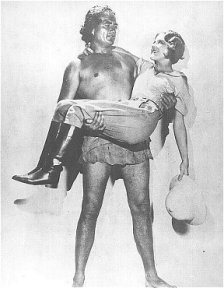
As radio's Tarzan and Jane in 1933
|
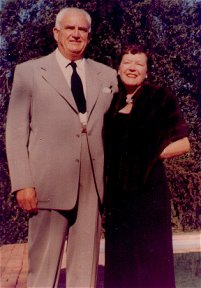
Our 40th wedding anniversary in 1968
|
In 1964, Joan and I decided it was time for me to retire. After a lot
of though, we decided on Apple Valley. Joan was still active in ERB, Inc.
as secretary-treasurer, and had to be within a reasonable distance from
Tarzana for board meetings.
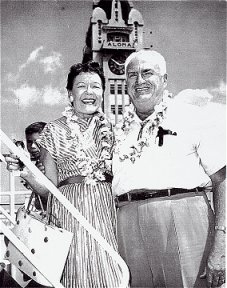 We
had visited Apple Valley several times. For many years, we maintained second
home in Wrightwood, a mountain retreat and ski resort a six thousand feet.
We spent many happy vacations and weekends in Wrightwood but there was
no golf course, and I often drove to Apple Valley to play. With the children
gone, skiing was no longer interesting, so we bought a lot on the edge
of the Apple Valley Golf Course and built our present home. It is rather
large with guest quarters, pool, and bath house with a sauna.
We
had visited Apple Valley several times. For many years, we maintained second
home in Wrightwood, a mountain retreat and ski resort a six thousand feet.
We spent many happy vacations and weekends in Wrightwood but there was
no golf course, and I often drove to Apple Valley to play. With the children
gone, skiing was no longer interesting, so we bought a lot on the edge
of the Apple Valley Golf Course and built our present home. It is rather
large with guest quarters, pool, and bath house with a sauna.
Golf was one of those lasting interests I picked up in Hollywood, where
I often played in a foursome with radio comedian Bob (Bazooka) Burns, Jack
Benny's announcer, Don Wilson, and Western star Kermit Maynard. Once on
the tee, Bob was coming down from his backswing to hit the ball when dynamite
exploded at a nearby building project. The explosion and his contact with
the ball were synchronized perfectly. He looked startled for a moment,
then in his inimitable Arkansas drawl said, "Now that's the way to sock
a golf ball."
Life in Apple Valley was pleasant and we made many friends, notably
Lloyd and Eleta Mangrum. Lloyd joined golf's Hall of Fame in 1964. He was
U.S. Open champion in 1946 and won many other major tournaments. Golf fans
know that he ranked with Ben Hogan, Sam Snead, and all the greats of the
postwar period. He was known for years as the squire of Apple Valley.
I attended two senior invitational tournaments in Las Vegas in 1965
and 1966 with Eleta, Lloyd, and Joan. I had the privilege of playing with
a different pro each day for four days. I won a few trophies and Lloyd
was still able to shoot a sixty-six. It was a sad day for me and everyone
else who knew him when he passed away from a heart attack in November,
1973.
Back home in Indiana, my father's second try at marriage with the same
woman started serenely, but soon fell in the same old unbearable pattern.
After several years, his health began to break. He decided to get away
for a while by visiting us in Apple Valley in 1965.
He had bowed out of the mayoral race even though he was sure of winning.
He felt he was mentally and physically unable to do a good job anymore.
After he had a mild heart attack, his doctor advised him to get away from
turmoil.
Through the years, he had accumulated a fair-sized estate, including
a large, prosperous farm that he rented out and and a half-interest in
a successful furniture factory. He also had some good stocks and bonds.
He benefited greatly from the peace and quiet of our Apple Valley home
and the blessed desert. Here he made the decision to get a second divorce
as soon as he could arrange it.
When he arrived home and announced his intentions, a tumult resulted.
He was so disturbed that he went to the hospital on the verge of another
heart attack. His doctor called me and said he thought I should fly east.
They had him isolated and I was the only one given visiting privileges.
Yet I arrived at his room one morning to find the preacher standing
over his bed. He was holding Dad's hand and praying that he would
reconsider the divorce. He had barged in, and it was obvious that Dad was
upset by the intrusion. I blew my stack and bounced him out fast.
Dad did not return home from the hospital but moved into a trailer next
to the home of a good friend, who assured me he would be cared for. Dad
was happy with the arrangement, so I left for Apple Valley.
After a week or so, he was up and around but had to take it easy. He
decided to see his lawyer about the divorce and set out to his office.
The walk was easy, but the office was on the second floor of the building
that had no elevator. He felt pretty strong and thought the stairs would
be no problem. He reached the outer office, but the climb made him woozy.
Searching for his nitroglycerin pills, he discovered that he had forgotten
to put them in his pocket. The secretary called his doctor and an ambulance
but it was too late.
I was notified by my sister, who lives on a farm near Shelbyville. I
was somewhat prepared for this but still broken-hearted. I flew back for
the funeral. I was proud to see how well he was loved by the entire town.
I remained for a few days to assist in settling his affairs. He had carefully
made out his will, so there were no complications. In spite of all the
battles and unhappiness, he had willed the home to his spouse. Many of
his personal belongings, watches, jewelry, mementos, and awards were left
to me. His car and all else of importance went to my sister. I have been
back a few times to visit Joanna, my sister. Many of his old cronies called
on me to tell me how much they and the entire town missed him.
While in Apple Valley, he once looked out of the living room window
onto the golf course, spotted me, and remarked to Joan, "There goes a fine
boy." I was already sixty five with white hair, but he just thought of
me as his boy. We never had an argument and were the greatest of pals.
In their final resting place, Dad and Joan are within arm's reach of each
other alongside my mother in Shelbyville's beautiful Forest Hills cemetery
where I will one day join them.
In the fall of 1966, NBC presented a weekly Tarzan TV series starring
Ron Ely. The network thought it would be a good publicity stunt to invite
all the living ex-Tarzans to Mexico City, where it was being filmed. Johnny
Weissmuller and I responded, and Jock Mahoney was already there playing
a villain in the series. Reporters from both sides of the border interviewed
and photographed us, and many top government officials attended a banquet
for the Tarzans.
In 1967, I was invited to Bloomington to participate in the
fiftieth anniversary ceremonies for all athletes who made their letter
""I" in any sport in 1917. Most of the men were now on the Geritol. and
prune juice team.
Only twelve of us were able to make it in various stages of decrepitude.
Some had canes, other crutches or walkers. One had Parkinson's disease,
another only half a stomach. Erosion had not yet set in on me, thank goodness.
It was wonderful yet depressing to see these old friends again. I had remembered
all of them through the years as they were in their prime.
Between halves at the game between Wisconsin and Indiana, University
President Herman Wells delivered a speech honoring us. Each of us had an
escort, a pom-pom girl who walked on the field with us and stood by our
side during the ceremony. To realize that we were once their age, full
of youth, joy, and vigor was at least a pleasant memory. At the same time,
I felt sad for them because they knew so little about life's problems to
come. In fifty years, they would be as weak, weary, and fatigued from wrestling
with life as we were at that moment. It made me wonder why people can't
live forever in their prime or come into the world as old fuddy-duddies
and leave as infants.
As the strains of the alma mater song faded out, there was not a dry
eye in our group. We knew we had taken our final bow at the place we loved
so dearly, where the happiest times of our lives had been spent. They say
that a few seconds before one dies, his whole life passes before him. That
happened to me while standing through the ceremony. It was a sad yet beautiful
feeling -- "Oh Death Where is Thy Sting" stuff.
There was not a sound from the 58,000 spectators for several seconds
after the music stopped. We stood frozen in our tracks with tears rolling
down our cheeks. Thank goodness Joan was there to witness this memorable
moment. Several of the dozen present that day are now racing the moon.
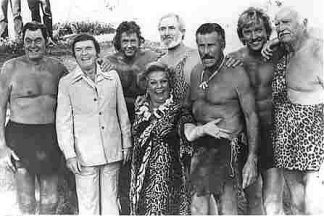 On
March 2, 1971, Merv Griffin gathered former Tarzans for his talk show on
CBS. Mahoney, Crabbe, Ely, and I were present. Merv was exceptionally gracious
and seemed happy to have us on the show. He said he was a longtime fan
of Tarzan and his ten-year-old son was thrilled to meet us. After the show,
hundreds of people were waiting outside the studio for autographs. We were
almost inundated.
On
March 2, 1971, Merv Griffin gathered former Tarzans for his talk show on
CBS. Mahoney, Crabbe, Ely, and I were present. Merv was exceptionally gracious
and seemed happy to have us on the show. He said he was a longtime fan
of Tarzan and his ten-year-old son was thrilled to meet us. After the show,
hundreds of people were waiting outside the studio for autographs. We were
almost inundated.
The following year, Garry Moore invited Joan to New York to appear on
"To Tell the Truth." She and two other women tried to stump the panel about
who was really the daughter of Edgar Rice Burroughs. I went along for the
ride, but when we got to the studio, they decided to put me on to identify
her.
It was a thrilling experience for both of us, especially staying at
the Waldorf-Astoria Hotel. I had never been to New York before, and Joan
had not been there since she was a little girl of ten. Garry Moore and
his panel showed us great hospitality before and after the show. Alan Alda
had once lived in Tarzana, it seems, and Peggy Cass had a dear friend that
knew us and had visited us in Apple Valley.
Not everything went that well during those years. One morning in 1970,
Joan noticed a lump on her left breast about the size of a hickory nut.
It wasn't painful but definitely was an unnatural formation. Our family
physician, Lew Shine, was greatly concerned that it might be a tumor, so
he ordered an immediate exploratory operation. If it were cancerous, he
would have to operate to whatever degree necessary. The biopsy showed it
was indeed malignant and widespread. He operated immediately.
After two hours had passed in the operating room, Mike, Joanne, and
I knew there was something serious going on. Finally, the doctor told us
he had performed a mastectomy to remove her cancerous left breast.
We were shocked and grief-strickened beyond words. The only consolation
was that he was as sure as he could be that they had gotten all the cancer.
At least it was a 50-50 chance that he had.
We could not see her for hours while she was in the intensive care ward,
so we went to a nearby hotel where we all sobbed our hearts out. I don't
think I ever felt closer to my children and they to me than in those few
hours. Poor, dear Mom, how would she handle it? It suddenly dawned on us
that she didn't know yet what had happened. Now she would need us more
than ever to help her get over the horrible shock.
We had to control our emotions and get ready to give her all the support
possible. At the hospital it was an anxious moment before we saw her. I
asked the nurse if she had been told. "No," the nurse replied, "but she
knows somehow."
Although Joan was somewhat woozy, she forced a smile and said, "Now
don't you worry. I am sure they got it all and I am going to be all right.
I'll be a little funny-looking, but I am going to be all right. I'll be
a little funny-looking, but at least I will be with you." She seemed more
interested in bolstering our morale than in what had happened to her. That
was typical of her character. Almost immediately, a woman from an organization
whose members had undergone mastectomies, came in to bolster her morale,
but Joan soon had her laughing about the whole thing. The courage and determination
that Joan showed shall always inspire me to slug it out, no matter how
rough the going gets.
The post-operation procedure was long and painful. The area was open
and raw and had to be healed by medication. Along with that, she had to
go for therapy and cobalt treatment three times a week for almost a year.
We had to drive one hundred miles from Apple Valley to Encino for this.
Through it all, she never complained, painful and tiring as it was.
She could not lie down flat in bed after the operation, so I got her
a large reclining chair that folded back to where she was about half-sitting
up. It wa pathetic to see her sleeping in that uncomfortable position,
but it was easier for her to get in and out of this chair than a bed. As
soon as possible, I got a hospital bed so she could sleep in that position
and fold her knees comfortably.
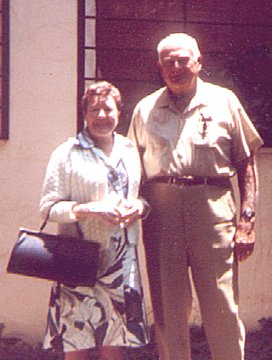 She
never recovered the full use of her left upper arm and shoulder because
all the ligaments and muscles were destroyed. She could use her arm in
any direction except to raise it over her head. She could drive the car,
cook, and carry on her everyday routine, however.
She
never recovered the full use of her left upper arm and shoulder because
all the ligaments and muscles were destroyed. She could use her arm in
any direction except to raise it over her head. She could drive the car,
cook, and carry on her everyday routine, however.
We walked daily for exercise and, when she had healed, she would carry
a golf ball and a club along and whack away, even though she knew she would
never play again. We took a putter to the green near our house where she
could putt all right, and derived a lot of pleasure from this recreation.
Through all of this she never whined about her misfortune once. She said
she was so happy to be with us that all else was secondary.
While Joan was learning to live with her handicap, I suddenly was hit
with a heart attack about 3 a.m. on April 5, 1969. H had been feeling great
the day before and never had an indication of a heart problem in my life.
I had shot a 74 round of golf that day -- 5 birdies. I had just had my
annual physical and seemed in great shape.
I awoke with a terrible pain in my chest, as if Tantor the elephant,
were standing on it. I could hardly breathe and was sweating as if in a
sauna bath. I waited for a few minutes, thinking it was acute indigestion
or something, and that it would pass. I was the last person in the world
that a heart attack should have hit. I do not smoke or drink, and I had
not even had a beer in five or six years. I exercised daily -- swimming,
golf, and lifting a barbell. I couldn't imagine it was a heart attack,
but when I got out of bed and stood up, I fell on my face.
I did not call out to Joan, who slept in a separate room, for fear that
I would frighten her. I crawled to the telephone and had the operator call
Dr. Donald Dudley, a heart specialist, who had been handling our checkups
and minor problems since we came to Apple Valley. He lives only half a
mile from us and arrived in a few minutes. He checked me and said, "You're
having a heart attack. I will call the ambulance."
Then he awakened Joan as gently as he could. She was surprised to see
a doctor standing over her, but rose to the occasion, as always, and gave
me words of encouragement and comfort. The doctor gave me a shot to ease
the pain and soon the ambulance arrived. It was not easy getting me on
a stretcher at 6' 4" and 250 pounds. The shot had given me so much relief,
I think I could have flown to the hospital if they had just pointed me
in that direction. Luckily, St. Mary Hospital , just a mile or so away,
is equipped with one of the finest coronary care wards in this part of
the country.
I had really had a massive coronary, and soon found myself hooked up
to all kinds of machines and an oxygen tank. I was wired in about every
spot on my body and must have resembled an underdressed astronaut. I was
conscious through it all, though still heavily sedated, and my condition
soon stabilized.
My daughter was notified by the hospital and was there in two hours
from Fountain Valley. Dr. Dudley had the Red Cross tell Mike to fly home
from Vietnam because I was on the critical list. I did not know he was
coming and when he arrived in three days, it finally struck me that I might
not make it.
I was in the intensive care ward for several weeks because of problems
with my heart's rhythm. Finally, they hooked me up to a pacemaker and I
began to respond. It was hooked onto my arm and wires were injected into
a vein and into my heart.
Later on, I was moved to the general ward, but I was still wired up
to the monitor near my room. After four months, I was told that I would
need a pacemaker implanted into my chest.
The idea that I would have to wear this machine the rest of my life
really shook me up, because I had heard of these devices going haywire
around electronic equipment, such as electric ovens and certain machinery.
I had visions of walking into a restaurant or a home, perhaps while traveling
some place, and having the buzzer short out.
I tuned in on the prayer hotline, mind over matter, and everything else
I could think of. Then the day came for me to go to St. Bernardine's Hospital
in San Bernardino, where there was a specialist who installed pacemakers.
I was felling pretty good by now. I had been walking around the hospital,
had bathroom privileges, and ate everything they gave me, although it wa
a special diet and not too appetizing.
Joan and her pal, Edith Maynard, Kermit's widow, drove me there for
a week of observation. I was again wired up to the monitor just across
the hall from my room. They would shut off the pacemaker every two or three
hours and put me on my own for a while.
Finally, on a Friday, the doctor said he would schedule me for the operation
on Monday at 10 a.m. I prayed harder than Billy Graham, Oral Roberts, Norman
Vincent Peale, Billy Sunday, and Bo McMillin of the Praying Colonels, all
put together.
I must have gotten through to the Great Coach of life, because when
the doctor came in Sunday night, he couldn't believe what he saw and heard
on the monitor when they disconnected me from the pacemaker. He was startled,
if not amazed. "If tomorrow morning you check out this same way,
we will have to postpone this operation for a while," he said.
Morning arrived with similar results and he said, "You'll have to stay
around a couple days to see if there is going to be any change. If there's
no change, you're going to be able to go home." So I did, though on a strict
diet.
I had gone from 258 pounds to 218 pounds in this ordeal, which was the
silver lining in a grimly black cloud. My regular weight is 225 pounds.
I have always had a big appetite but only ate at regular mealtimes. When
I retired and was at home a lot, however, I became strictly an icebox man.
Perhaps I was restless after such an active life.
The first thing I did whenever I came into the house was hit the ice
box. It got so Joan would leave notes for me there if I had a call that
was urgent. Otherwise, I would be snacking constantly on salami, hot dogs,
pastrami or Italian sausages.
Joan was a good cook, too. Meals included white bread, potatoes, sausage
and pork chops. I loved it all, most of it loaded with cholesterol. All
the arteries and veins in my body were corroded and lined with a deposit
that left them only about half open. My heart had to work harder to circulate
the blood. It took it as long as it could, then conked out.
After about sixty days of recuperating at home, I gradually returned
to golf, one or two holes at a time with a cart. The day I had my attack,
as I mentioned, I shot a seventy-four with five birdies. All of my buddies
said those birdies were too great a shock. I was shooting to a ten handicap
at that time. When I stared again, I went suddenly to sixteen handicap.
Two years later, I got back to a twelve and hope to get to ten again soon.
I have had one hole-in-one and two scores of seventy four in Apple Valley.
I hope to shoot my present age soon -- 75. When I shot a 74, I was 69 years
old.
Now that I was in good health again, and Joan was also, except for her
crippled arm, we decided to do what we had hoped to do all of our lives
-- take a leisurely trip around the world by air and sea. But it was not
to be. After a wonderful Christmas with all of our grandchildren, my darling
Joan suffered a massive heart attack on December 30, 1972.
She had been to the hairdresser and I had been playing golf. I arrived
home before she did and was watching TV. I heard a car door slam and in
a little while, longer than usual, the garage door into the house opened.
She always called out, "I'm home! I'm home!" but this time she didn't.
I called to her, "Hey, Joan, what's up?" When she did not answer, I rushed
to the kitchen where she was hanging onto the sideboard in a collapsed
position.
She mumbled, "How does it feel when you have a heart attack?" I answered,
"Oh, you are just a little faint. You'll be okay." But I knew better --
something was really wrong. I picked her up and carried her to her bedroom.
She became violently ill, and passed out cold.
I grabbed an aromatic spirits of ammonia capsule from the first aid
kit, broke it open, and poked it under her nose. She rallied a little and
opened her eyes. I called Dr. Dudley's exchange immediately. This was about
5 p.m. The operator said, "Dr. Dudley is in Victorville (about six miles
from our house). I'll contact him at once." He wore one of those buzzers
that alerted him to call his office.
By now Joan had revived a little and insisted that I clean her up before
the doctor arrived. She was always so immaculate and she couldn't bear
to let the doctor see her in a messy condition. I told her, "It's not that
important. Doctors understand."
But she pleaded and I tried my best, knowing she should be lying as
quietly as possible. I tried not to move her. She drifted off once more
and I again applied the ammonia capsule to revive her.
Dr. Dudley called to say he would be there as soon as possible. Joan
kept telling me to take it easy, fearful that this shock would bring another
heart attack on me. Typical, she was more concerned over me than her own
condition. When Dr. Dudley arrived, he called an ambulance and rushed her
to the St. Mary hospital's coronary ward.
Mike lived in Alexandria, Virginia, and my daughter, Joanne, lived in
Fountain Valley, 125 miles away. Joanne was at the hospital in about two
hours. Mike got a plane out of Dallas Airport, near Washington, D.C., and
was here by 2 p.m. the next day.
By then Joan had stabilized somewhat, but was on the critical list in
the intensive care ward. She was conscious and we could see her one at
a time for one minute with no conversation. The doctor did not give us
much hope. At 4 p.m. we went home to wait. We were all three almost in
a state of shock.
About 6 p.m., her nurse called to say Joan was feeling much better and
wanted her makeup box. It gave us a great lift to know that she wanted
to primp up. At 8:30 we went to see her and take her makeup. She was smiling
and chipper during our short visit. Before I left her side, she said, "Now
you take the kids out and get them a good dinner and I will see you in
the morning." She threw me a kiss and gave me a big smile as I left the
room.
We did not feel like going to dinner, of course. We were all tired and
emotionally wrung out and MIke had been up all night, so we went to bed
about 11 p.m. on December 31, 1972.
There was no sleep for any of us, and at midnight the phone rang. Joanne
grabbed it from next to her bed. Mike and I ran into her room.
"Oh, my God!" was the first thing we heard; then she burst into uncontrolled
sobs. As we knew down deep already, "Mom just passed away," she sobbed.
We dressed as quickly as possible, even though Dr. Dudley said not to come
to the hospital since there was nothing we could do. I said, "I'm going,
no matter what. I want to be as close to her as possible." The kids felt
the same way. We were all three sobbing uncontrollably.
Most of all, I shall never forget that terrible feeling of finality.
Our whole forty-four years together rolled past my mind in dizzying flashbacks.
I went to pieces at the hospital, and the doctor had to give me a shot
to calm me down. He suggested I stay at the hospital that night so they
could keep an eye on me. He was afraid I might have another heart seizure.
I told him that I wanted to be with my children. "Call me if you need
me," he said. Going into the house, knowing she would never be there again,
was almost more than I could handle. To see al l of her things around
was the saddest sight I will ever encounter.
The doctor had given me some sleeping pills and told the kids to keep
a close eye on me. But all three of us were crying too much to sleep and
it was almost daylight before the pills worked.
She had devoted her entire life to the family and was the most honest
person I ever knew. She didn't know how to be dishonest. She never could
tell when people were using her because she didn't have any idea how to
cope with dishonesty. I could usually sense these things, and when I knew
someone was taking advantage of me, I was always furious. She could never
understand how I knew.
My last memory was of her throwing me a kiss and saying, "I'll see you
in the morning, sweetheart." These words shall never die. I'm sure I'll
see her somewhere one fine morning -- maybe on Mars with her father.
Our funeral agreement was set up many years ago in keeping with the
custom of her family. I agreed, because I never liked my family's custom
which was to have the remains lie in state for days.
My grandmother died when I was ten and I shall never forget my traumatic
feeling when I was taken into the parlor for a last look at her, laid out
among banks of flowers surrounding her casket. All the rest of my life
I could recall that scene before I could recall her beautiful life, and
how she loved and cared for me. Joan and I decided that those things were
pagan, that it's more beautiful to remember people as alive and happy.,
I went through this same thing with my mother and father. For two or three
days, people filed through the house and I broke down every time someone
offered sympathy.
Our agreement was based on Ellen Terry's poem: "No funeral gloom, my
dear, when I am gone. Corpse gazing, tears, black raiments, and graveyard
grimness. Think of me as withdrawn into the dimness, yours still and you
mine. Remember all the best of our past moments and forget the rest, and
so to where I wait, come gently on."
The ashes were to be sent to Shelbyville where our family plot is located.
My wonderful Dad loved Joan so much that he had headstones made for both
of us with the name Tarzan on mine and Jane on hers. Our real names would
be on the main monument.
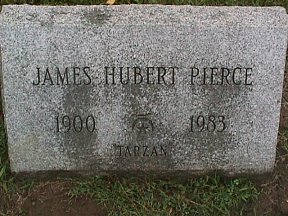
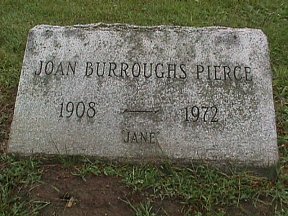
The doctor told me that I should not go to the burial, but let my sister
take care of everything. He was still afraid that grief and hypertension
might provoke another seizure. He suggested that I spend a few weeks with
Mike to get away from the house. He game me some tranquilizers and sleeping
pills, as well as a copy of my case history and the name of a doctor in
Alexandria in case I needed help.
After a day and a night in Alexandria, I decided to be there when they
put the urn in the vault alongside where I will be one day. Mike was against
this, but he realized my mind was made up. My sister met me at Indianapolis
and took me to her home in Shelbyville.
Two days passed, and the urn still hadn't arrived. The undertaker in
Victorville put out a tracer and learned it was sent to Shelbyville, Illinois.
this made a trying experience worse because we were afraid something had
happened to the ashes. Two days later, the urn arrived safe and sound.
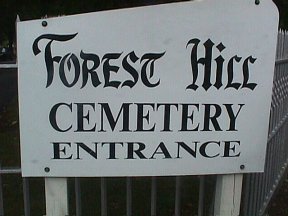 My
sister and her husband were the only ones at the graveside with me. I placed
a dozen red roses, her favorite flower, in the vault and felt relieved
that I had come. It was a sad experience, but I felt that she knew I was
there. It is a beautiful graveyard, and Joan is just an arm's length from
my dear father. One day I will join them back home in Indiana where I belong,
forever.
My
sister and her husband were the only ones at the graveside with me. I placed
a dozen red roses, her favorite flower, in the vault and felt relieved
that I had come. It was a sad experience, but I felt that she knew I was
there. It is a beautiful graveyard, and Joan is just an arm's length from
my dear father. One day I will join them back home in Indiana where I belong,
forever.
I was supposed to return to Alexandria for a long visit with Mike's
family, but I now felt anxious to get back home where I knew Joan's spirit
would be awaiting me. There I could be closer to my memories and her spiritual
presence. Meanwhile, my daughter Joanne had taken all Joan's intimate things
from her bureau drawers and emptied her wardrobe closets, hoping to ease
the pain of finality.
The first night alone in the house was eerie. I was startled at what
seemed to be her voice calling me. Many friends wanted me to spend time
with them, especially the nights, but I could not do it. Her spirit was
still everywhere and I wanted to be near it.
Learning to live alone is one of the most important lessons one can
ever learn. There is nothing strange about enjoying solitude, if you can
call it enjoyment, for at least it is an example of a person's solid sense
of self. It is a feeling of independence from others, being able to take
care of and appreciate oneself without needing someone else to validate
one's existence. I have never found a companion, outside of my darling
Joan, so companionable as solitude. In this solitude, Joan is always with
me. I have never felt closer to her than now that she is here only in spirit.
At first, I found myself calling her before I realized that she was not
there.
I gradually felt a new start in life that will take both Joan and me
throughout eternity. I am lonely, but not in an unpleasant, depressed way,
because there are so many pleasant memories to fill in the gaps between
the past and the future.
One thing I want to stress is that Joan is really the main character
in this story. Without her and her great love, I could have gone down the
drain. I had been highly respected in my college career and in athletics
before Hollywood smashed my ego down to practically nothing. Joan was always
there to bolster my morale.
I have had a good life, on the whole. I don't think anybody ever gets
through it without a lot of problems and crises, but I would do it all
over again if only to have Joan's love, respect, and companionship for
forty-four years. That was worth going through all the trials and tribulations
a million times over. No one can ever enter my life to take her place.
It would be sacrilegious -- I loved her so.
I do enjoy playing golf now and have some good buddies on the course.
We don't visit back and forth, nor did I have any other social life. I
don't see any of my old friends from the past. They were wonderful through
the whole thing and I had many letters of consolation from them, but I
now prefer to live a secluded life. I've been to all the fires, so to speak,
and Joan was right alongside me -- we did it all!
Yet another loss difficult to sustain was the death of Henry Miller
in May, 1975; the key to everything that happened to me after I left Indiana.
For more than fifty years, there was never a month that passed without
some communication between us. Besides being a brother Mason and Phi Delt,
he was a brother in every sense of the word. Since I had no real brother,
he filled a void in my life and left another with his passing.
On I go, lost in the past. Normal life seems to seep slowly and painfully
back. I am more or less a recluse, steeped in memories and immured within
these walls where Joan and I spent her last days. Old friends break me
up emotionally, so I do not see them and hope they understand. I have a
deep feeling for them, and hope the passing of time will take away the
fear of seeing them.
Living alone makes one a reluctant host. I am on a strict diet, and
eating out presents a problem. At home I am used to my limitations, though
what I cook for myself wouldn't suit normal appetites.
One bright spot is that Mike has to keep up his flying time with a strict
requirement of so many hours a month. George Air Force Base is only five
miles form my home, and about once a month, he and a fellow officer, Lt.
Col. Tom Hews, fly in for a fast weekend of golf.
Before Joan died, we had many visits from Navy and Marine Corps pilots
accompanying Mike on trips home -- six or seven men, at times. In 1970,
I was even made an honorary member of a Navy flyers' organization called
the Red Knights.
As the oldest living Tarzan, I am now seventy-seven years young, in
tip-top shape physically. I play eighteen holes of golf three or four times
each week, swim every day, and enjoy my sauna bath regularly.
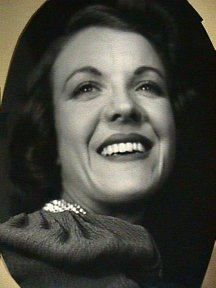 Fan
letters come in again when that "To Tell the Truth" show was rerun. It
saddens me to get letters addressed to Joan, and to have to tell people
she isn't here anymore. I send them pictures of her just the same. Joan
left us just a few weeks after that show, and I am happy she had the opportunity
to express one last time her pride in her father's achievements. I taped
the sound from the broadcast and play it occasionally just to hear my darling's
voice, as she delighted in fooling the panel of "To Tell the Truth" show.
I looked forward to the rerun so I could see my eternal sweetheart once
more.
Fan
letters come in again when that "To Tell the Truth" show was rerun. It
saddens me to get letters addressed to Joan, and to have to tell people
she isn't here anymore. I send them pictures of her just the same. Joan
left us just a few weeks after that show, and I am happy she had the opportunity
to express one last time her pride in her father's achievements. I taped
the sound from the broadcast and play it occasionally just to hear my darling's
voice, as she delighted in fooling the panel of "To Tell the Truth" show.
I looked forward to the rerun so I could see my eternal sweetheart once
more.
Horace Greeley said, "Go west, young man!" That I did. Aldous Huxley
said, "There is only one corner of the universe that you can be sure of
improving and that's yourself." That I am trying to do, especially my golf.


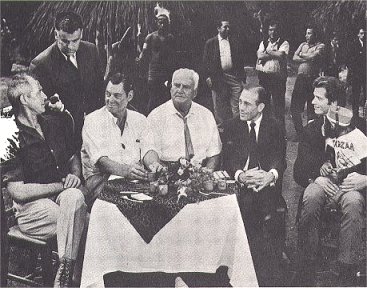
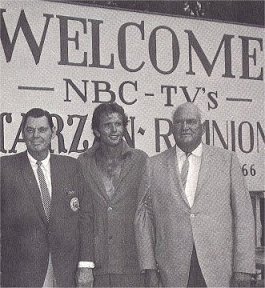
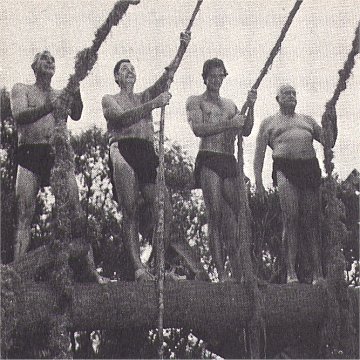
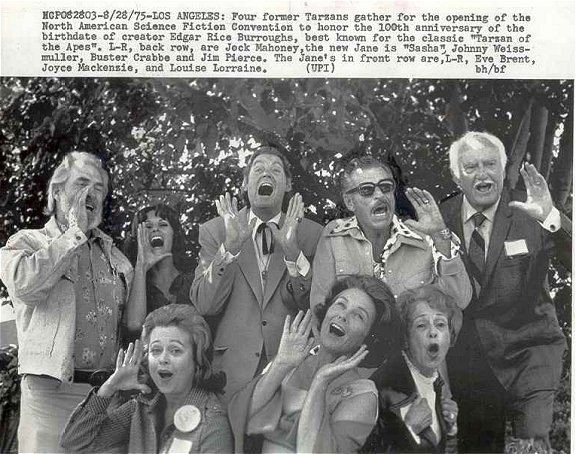
![]()
![]()
![]()
![]()

![]()